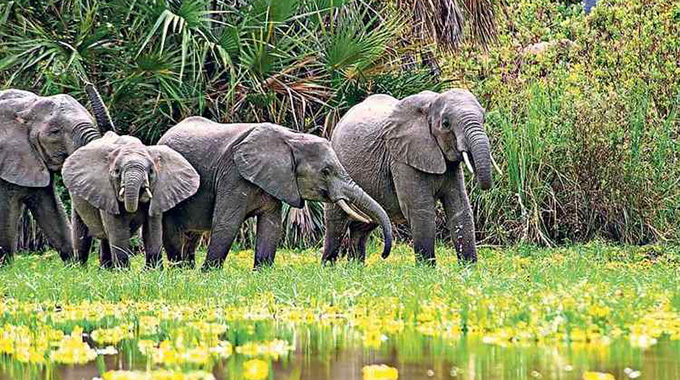Southern Africa talks tough on ivory trade

Jeffrey Gogo Climate Story
Ten years after wildlife watchdog CITES forced a ban on commercial ivory sales, elephant range states in Southern Africa have grown increasingly impatient and their willingness to keep up their end of the bargain may finally be waning out.
Zimbabwe, together with Angola, Botswana, Namibia and Zambia, last week said they would not be stopped from benefiting financially from their elephants, setting up a showdown with Cites state parties that have to date refused to throw the Southern African countries a lifeline.
President Mnangagwa said “the one-size-fits-all banning of everything under Cites, disregarding the good efforts and investments by our respective governments, is neither sustainable nor desirable,” but did not go so far as to break past promises on sustainable elephant conversation.
He was speaking at the first Elephant Summit held at Kasane, Botswana, primarily for range states in Southern Africa, home to more than two thirds of the remaining elephant population on the continent.
His comments were echoed by the presidents of Botswana, Namibia and Zambia, who were also in attendance.
The message from the five African countries appears to be both an implicit plea and a threat to the Convention on International Trade in Endangered Species (Cites), which meets for its biennial conference in Colombo, Sri Lanka, next month.
It is not clear what the threat, if indeed it’s one, may entail, but there’s always the realistic possibility of withdrawing from the Convention.
The time for strategic patience may long be past. In February, Zimbabwe, Botswana, Namibia and South Africa, which account for a combined 61 percent of the African elephant herd, wrote a 12-paged proposal to the Cites.
The document is thought to be highly charged compared to previous attempts by the proponents to end the financial censorship and the monopoly, which have come to define Cites as far as ivory trade is concerned.
In their proposal, the four countries are seeking to amend Annotation 2 of Cites Appendices in order to remove the restrictions and allow international trade in registered raw ivory.
The planned amendments are on the basis that previous elements of the restrictions “are no longer relevant or not appropriate,” especially in view of the expiry of the nine-year moratorium on commercial ivory sales in 2017.
The matter will be heard in Sri Lanka.
The states detail how the system has been rigged against them by an incapable global organisation for decades, even when they have individually shouldered the burden of conserving a growing elephant herd using scarce domestic finances, for the world’s benefit.
“Cites has acted as an inhibitor and not an enabler of progress,” the countries charged in the proposal, which has already been lodged with the international wild animals body.
Citing the examples of Zimbabwe and Namibia, where rights over wildlife have been legally transferred to local communities, helping to expand elephant numbers and habitat, the self-funding proponents called out Cites’ continued rigidity as a betrayal of their dedicated efforts, in light of the scale of money needed to make wildlife protection work.
“These programmes are being undermined by arbitrary decisions by Cites that remove rather than create incentives for conservation,” they stated.
“The proponents can no longer accept that their working conservation models are undermined by an international organisation that ostensibly recognises that ‘peoples and states are and should be the best protectors of their own wild fauna and flora’; or ‘that commercial trade may be beneficial to the conservation of species . . . or to the development of local people when carried out at levels that are not detrimental to the survival of the species in question.”
Against this background, the Kasane elephant meeting is therefore instructive in many ways.
It reiterates a position that Southern African range states have taken towards enjoying the financial benefit of their success at conserving the elephant, largely with own funding.
This is a position they now look likely to defend at whatever cost.
Southern Africa’s shot across the bow could portend the end of a deal of strategic patience for Zimbabwe and its friends, against the monopoly institution that Cites has become, which says frightening things about the independence of the entire system.
The ball is now in the court of state parties under the Convention to lift the ivory ban and allow for controlled trading within the auspices of Cites, as in times past.
The big question is how Cites, in Colombo, responds to the demands from Africa’s largest elephant range states. Zimbabwe, with an elephant population of 80 000, the world’s second largest after Botswana’s 165 000, wants to be allowed to sell a portion of its 70 tonne ivory stockpile to help raise money to protect the African elephant, a prime target for poachers.
Until now, much of the conservation work is self-funded mainly from paltry Government budgetary allocations. Botswana, Namibia and South Africa are also looking to Cites for approval to sale 20 000kg, 10 000kg and 30 000kg of ivory, respectively.
The sales, as in Zimbabwe’s case, are motivated by the need to raise funds for conservation of the same.
God is faithful.










Comments